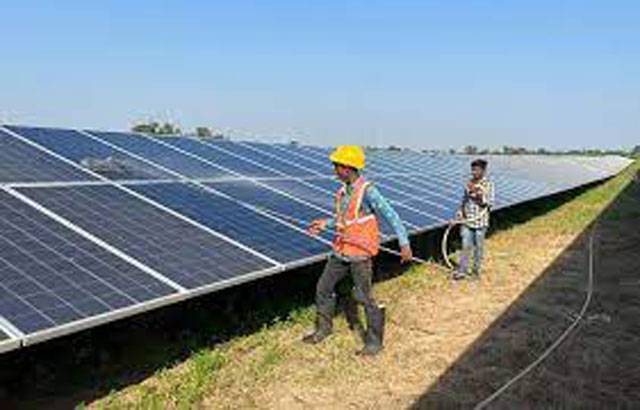ISLAMABAD-A policy is in the final stages of approval to promote the localization and indigenization of solar manufacturing and plug the outflow of sizable capital in terms of their import, reported WealthPK.
The policy aims to promote the local manufacturing of solar panels and allied equipment and provide much cheaper and quality equipment to the consumers, said Aqeel Hussain Jaffri, Policy Advisor Alternative Energy Development Board (AEDB), while talking to WealthPK. The Engineering Development Board (EDB) has devised the policy by taking all stakeholders on board. Jaffri said local production of solar panels and allied equipment will not only save valuable foreign exchange, but also encourage the local industry to invest in the production of solar panels and allied equipment. More investment in this sector will open up more job opportunities for the engineers and technicians, he added.
Under the policy, local manufacturers of solar panels and allied equipment of a specific capacity will also be provided with certain incentives like tax exemption for ten years. The policy will also encourage public-private partnerships (PPPs) in renewable energy grid investments, which will help the government overcome its financial constraints. Jaffri opined that owing to the increasing energy demand, people were opting for solar panels. The increasing energy demand has necessitated the promotion of local manufacturing, which will not only provide critical support to the domestic industry but also save the foreign exchange spent on imports.
Recently, the country’s demand for power has reached almost 29,000MW against the total generation of around 22,000MW, creating a considerable gap between the demand and supply, resulting in load shedding. Solar PV has already reached grid parity in Pakistan, as it is a cheaper source of power procurement compared to fossil fuels and even other renewables. It is worth mentioning that electricity consumption is expected to increase up to 28 percent by 2040. As per the Sustainable Development Policy Institute (SDPI), Pakistan meets around 88 percent of its energy demand through imports and rupee depreciation has inflated the oil import bill. This burden coupled with electricity shortages, collection deficit, and pervasive circular debts, appears as an economic challenge for the country.
Sunday, May 19, 2024
Policy on solar panels indigenisation on the cards

MCL removes encroachments
May 19, 2024
Health minister reviews anti-dengue operations
May 19, 2024
Commissioner visits disposal plant in Shadbagh
May 19, 2024
NEPRA’s Neglect
May 19, 2024
Colonial Grip
May 19, 2024
Confrontational Politics
May 19, 2024
Sports & Genocide
May 18, 2024
Healing AJK
May 18, 2024
Unsung Heroes of Society
May 19, 2024
Water Shortage in Our Area
May 19, 2024
The AI Trap
May 19, 2024
Continuing Narrative of Nakba
May 18, 2024
Teacher Struggles
May 18, 2024
ePaper - Nawaiwaqt
Advertisement
Nawaiwaqt Group | Copyright © 2024





